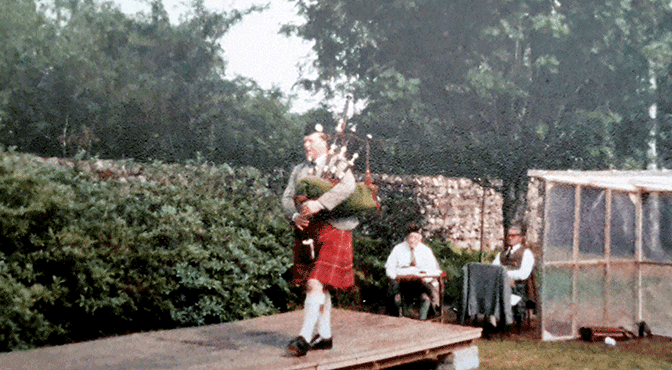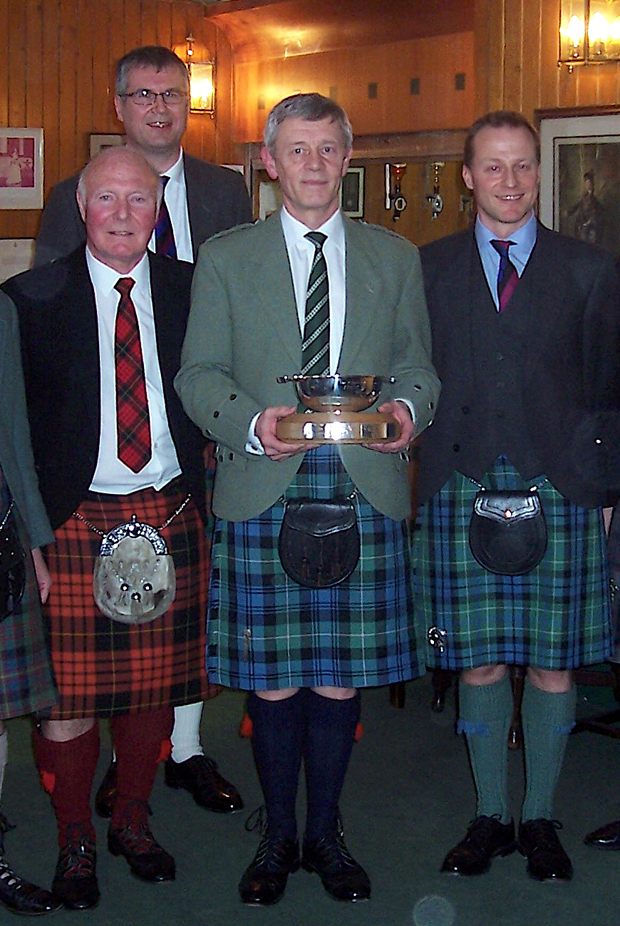
Further to my comment about the slow playing of 2/4 marches, and concerned that I was talking out of turn, I had a listen to a recording I made back in 1982. The tempo is more or less the same as Hugh MacInnes‘s. The tunes are Highland Wedding and Jeannie Carruthers:
I then had a listen to a selection of marches from the PP archive and they all confirmed that march tempos of 40 and 50 years ago were ‘right up there’ 75 beats per minute anyway, if not more. Here’s John MacDougall (pictured above) at the Argyllshire Gathering in 1971:
From there I checked out the playing of a few of the top individuals of today and the marches were all under 70 bpm. Suspicions, prima facie, confirmed.
I wonder if someone has the time to do a proper survey for PP? I’m sure it would be of considerable interest. I think it is important that we listen to individual march competitions mind you.
Pipers these days tend to play safe in the march section of their MSRs trying to be clean and steady, away from the edge, and hoping for some inspiration in the strathspey and reel. In my experience it rarely happens; a dreich march begets a dreich S&R.
This is where MSR playing loses its attraction. The pipes today are all exceptional and the fingering usually the same, but the drive is too often missing.
Last comment on pipe marches for today. Duncan Watson wrote to the Piping Times in 2002 stating that he had timed 2/4s played by John Burgess, recognised as a fine march player, and his tunes were all ‘nipping along’ at 78 bpm.
Alastair McQueen
Doing a gig in Rothesay the other week I bumped into David MacQueen son of Alastair. His dad, he told me, had died just over a year ago. Some readers will have known Alastair from his regular trips from Bute to attend the Piobaireachd Society Conference, the Archie Kenneth Quaich, the Glasgow Highland Club and the Veteran Pipers.
David told me that someone had written a tune in his father’s memory entitled the ‘Rothesay Butcher’ (for that was his trade). Unfortunately he had lost his copy and wondered if anyone had any knowledge of it. Well, is the composer out there? If so please get in touch and I’ll pass the tune on. David still runs his dad’s shop and would like the tune framed and put on the wall.
Alastair was a delightful man and a great supporter of piping. He deserves a tune in his memory. A fine amateur piper, he placed second in the Archie Kenneth Quaich in 2009 playing I Am Proud to Play a Pipe.

During the interval at the concert I was approached by local piper Peter Ferguson. He was a pupil of Donald MacLellan of Rothesay, he of the famous Donald MacLeod 2/4, and Angus John’s father.
Peter and Alastair were friends and often chatted about piping. Peter proposed a pact whereby they would each agree to play at the other’s funeral, depending on who died first. Quick as a flash Alastair shot back: ‘You’re not good enough to play at my funeral!’
Northern Ireland BB
Gilbert Cromie reports from the Province: The 10th Bangor BB Old Boys Pipe and Bugle Band have been invited to take part in this year’s annual Beating Retreat on Edinburgh Castle Esplanade on Saturday, May 4th at 7.30 and 8.15pm. P/M Scott Williamson said previous band trips have seen them travel to England and Denmark, but this was a first for the North Down Company. The pressure is on the buglers who will start the whole proceedings with a fanfare.
The Boys’ Brigade is steeped in history and tradition, particularly with regard to the marching band movement. By 1910, seventeen years after its formation, it had a staggering 868 bands across the UK including 132 pipe bands. When the BB in Scotland celebrated its Jubilee in 1933 there was a massed band of 637 pipers and amongst its ranks was Bill Millin who is remembered for playing his pipes at the D-Day landings.

William McVicker brought the BB to Ireland in 1888 forming the first company in Belfast after which it spread across the island. One of its first pipe bands, the 13th Belfast, performed at the annual display of the Belfast Battalion in the Ulster Hall in March 1895.
The Belfast Battalion inaugurated a band competition in 1921 when pipe bands competed for a cup presented by Alderman TE McConnell OBE, MP, with the winners being the 15th Belfast BB. The 15th also won the North of Ireland Bands Association’s 9th Annual Championships of Ireland when pipe bands competed in it for the first time in January 1921. The 10th Bangor won the McConnell Cup fourteen times.
Pipe Band Gradings
The RSPBA’s Music Board has announced the following new gradings:
NJB to 4B (by request): Lower Clyde P&D (previously Lower Clyde Development)
New Registrations:
NJB: Erskine Stewart’s Melville
4B: Kirkwall City, Gorey PB
4A: Stockbridge, Old Scotch P&D, Siren City, Long Beach, Theipval Memorial
3B: Macalester College

























I have been a piping adjudicator in Australia for many years and can agree that the March has tended to slow over that time. While I might allow for a somewhat slower tempo for a junior or inexperienced player, I would expect an advanced piper to play a bright March tempo. If anything, the latter enhances rather than diminishes the effect of the strathspey meter at the change. I’d also note that many young pipers tend to ‘cut and paste’ their band’s MSR for solo competition, and give little thought to how their tempos might sound solo.
Of course, there is no such thing as ‘correct’ tempo, but like expression, it should always sound appropriate for the style and type of tune.
Hi Rob, interesting comments and March bpm, and the recordings were great context. I always felt Alasdair Gillies had great tempo as well. Generally great modern players will do a recital, or album, with higher 2/4 tempos, but don’t want to do so in competition.
My thought on having this tempo rise become accepted, and how to change it, lies with what judges reward (or don’t reward) when it comes to competition. They are gatekeepers, so to speak, on this type thing. If they stop rewarding slow March playing, I think players will soon realize the changes they need to make (if they want to win).
Interesting point re recital 2/4s v competition 2/4s Palmer. You are absolutely correct: it is up to the judges to reward the bright, musical playing.